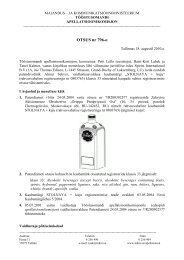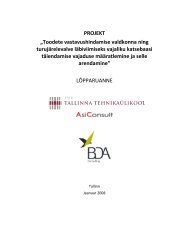Feasibility study for an Estonian Materials Technology Programme
Feasibility study for an Estonian Materials Technology Programme
Feasibility study for an Estonian Materials Technology Programme
Create successful ePaper yourself
Turn your PDF publications into a flip-book with our unique Google optimized e-Paper software.
64<br />
<strong>Feasibility</strong> <strong>study</strong> <strong>for</strong> <strong>an</strong> Estoni<strong>an</strong> <strong>Materials</strong> <strong>Technology</strong> <strong>Programme</strong><br />
2. <strong>Materials</strong> technology in Estonia<br />
Some small ef<strong>for</strong>ts are underway to tackle these problems. At Tallinn University of <strong>Technology</strong>, the Department<br />
of <strong>Materials</strong> Science has taken in two industry PhD students <strong>an</strong>d the research is being done together with<br />
Crystalsol OÜ. Similarly, the Department of <strong>Materials</strong> Engineering has taken in at least one industry PhD student<br />
<strong>an</strong>d the work is being done together with Norma. The government provides separate support <strong>for</strong> this.<br />
In 2010, a two year specialisation in n<strong>an</strong>otechnology under the physics Master’s <strong>Programme</strong> was made available<br />
at Tartu University together with the N<strong>an</strong>otechnology competence centre. It works in collaboration with<br />
approximately seven industry partners, all partners in the competence centre. Ef<strong>for</strong>ts have been put into advertising<br />
this program, however m<strong>an</strong>y comp<strong>an</strong>ies beyond the partners had not heard of it yet. At this stage it is<br />
difficult to comment on the success of these programs as they are so young.<br />
University of Tartu <strong>an</strong>d Tallinn University of <strong>Technology</strong> also have a joint Graduate School of <strong>Materials</strong><br />
<strong>Technology</strong>.<br />
International graduates were thought as <strong>an</strong>other problem. Compared to Western Europe salaries in Estonia are<br />
rather low <strong>an</strong>d it is difficult to attract <strong>for</strong>eign students <strong>an</strong>d researchers. Currently, most of the Master’s teaching<br />
is also conducted in Estoni<strong>an</strong>. Nonetheless, the Department of <strong>Materials</strong> Science at the Tallinn University of<br />
<strong>Technology</strong>, together with the Tartu University has opened a new international Master curricula in “Processes<br />
<strong>an</strong>d materials <strong>for</strong> sustainable energetics“. The education by the curricula is focused on the science <strong>an</strong>d technology<br />
of different energy materials. At the moment students from 11 countries are taking courses from the<br />
curricula. Related to materials technology, the Institute of Chemistry at Tallinn University of <strong>Technology</strong> has<br />
also started the first international <strong>study</strong> program on combining chemistry <strong>an</strong>d biology. Currently this is the<br />
only program in Europe teaching the subject. Other western competitors c<strong>an</strong> be found in U.S.<br />
On Europe<strong>an</strong> scale, <strong>an</strong> <strong>an</strong>alysis of specialisation <strong>for</strong> high-growth disciplines indicates that chemistry, physics<br />
<strong>an</strong>d most br<strong>an</strong>ches of engineering have shown a relative decline in researchers specialising in keys areas<br />
directly impacting n<strong>an</strong>o- <strong>an</strong>d materials technology <strong>an</strong>d processing technologies ability to deliver new products,<br />
processes <strong>an</strong>d m<strong>an</strong>ufacturing jobs 65 . It seems that despite the ef<strong>for</strong>ts of the EU to seek to increase its<br />
investment in cooperative tr<strong>an</strong>slational research in m<strong>an</strong>ufacturing, there appears to be insufficient support<br />
to Europe’s higher education sector to train young researchers in the key technical disciplines to deliver the<br />
results. The report believes that new measures are needed within the Europe<strong>an</strong> NMP framework programme<br />
to increase the gene pool of early stage researches engaged in tr<strong>an</strong>slational cooperative research with industrial<br />
researchers.<br />
To bridge the gap between education <strong>an</strong>d especially the traditional industry co-operation is extremely import<strong>an</strong>t.<br />
Most of the industrial interviews conducted suggested that the education <strong>an</strong>d thus graduate students<br />
at universities do not fit their needs. Theoretical knowledge of students is good but they lacked the skills <strong>an</strong>d<br />
experience to work in the industry. In general it is not wise <strong>for</strong> <strong>an</strong>y university to provide students <strong>for</strong> the need<br />
of just one comp<strong>an</strong>y. However, a joint ef<strong>for</strong>t in e.g. practical works <strong>an</strong>d thesis works would benefit both.<br />
Comp<strong>an</strong>ies should either give ideas to practical works or hire students <strong>for</strong> the duration of the work. The government<br />
could support this kind of activity more actively.<br />
There is at least one <strong>Technology</strong> plat<strong>for</strong>m in Estonia trying to bridge the gap: the m<strong>an</strong>ufuture Estoni<strong>an</strong><br />
Plat<strong>for</strong>m. The initiative is coordinated by Mechatronics Association in partnership with Tallinn University of<br />
<strong>Technology</strong>, Innovative M<strong>an</strong>ufacturing Engineering Systems Competence Centre (IMECC), <strong>an</strong>d Federation<br />
of Estoni<strong>an</strong> Engineering Industry. The mission of the M<strong>an</strong>ufuture Estonia plat<strong>for</strong>m (being in line with the<br />
Europe<strong>an</strong> M<strong>an</strong>ufuture Plat<strong>for</strong>m) is to propose a strategy <strong>for</strong> the industry, based on research <strong>an</strong>d innovation,<br />
<strong>for</strong>:<br />
speeding up the rate of industrial tr<strong>an</strong>s<strong>for</strong>mation;<br />
securing high added value employment;<br />
winning a major share of world m<strong>an</strong>ufacturing output in the future knowledge driven economy.<br />
65 NMP EXPERT ADVISORY GROUP (EAG), POSITION PAPER ON FUTURE RTD ACTIVITIES OF NMP FOR THE PERIOD 2010 – 2015





